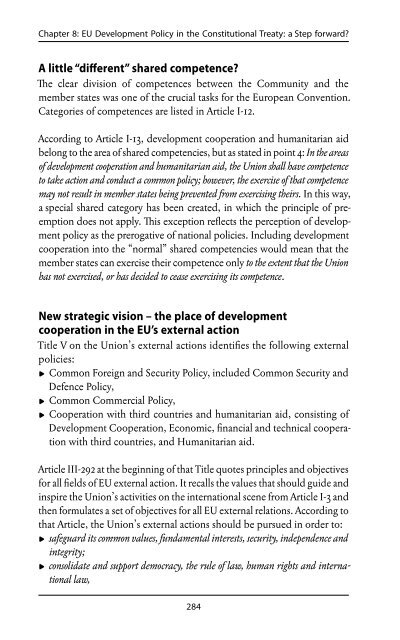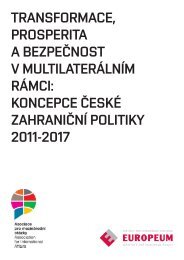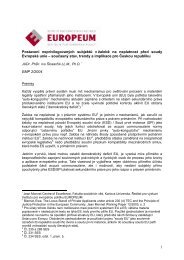eu constitutionalisation - EUROPEUM Institute for European Policy
eu constitutionalisation - EUROPEUM Institute for European Policy
eu constitutionalisation - EUROPEUM Institute for European Policy
You also want an ePaper? Increase the reach of your titles
YUMPU automatically turns print PDFs into web optimized ePapers that Google loves.
Chapter 8: EU Development <strong>Policy</strong> in the Constitutional Treaty: a Step <strong>for</strong>ward?A little “different” shared competence?The clear division of competences between the Community and themember states was one of the crucial tasks <strong>for</strong> the <strong>European</strong> Convention.Categories of competences are listed in Article I-12.According to Article I-13, development cooperation and humanitarian aidbelong to the area of shared competencies, but as stated in point 4: In the areasof development cooperation and humanitarian aid, the Union shall have competenceto take action and conduct a common policy; however, the exercise of that competencemay not result in member states being prevented from exercising theirs. In this way,a special shared category has been created, in which the principle of preemptiondoes not apply. This exception reflects the perception of developmentpolicy as the prerogative of national policies. Including developmentcooperation into the “normal” shared competencies would mean that themember states can exercise their competence only to the extent that the Unionhas not exercised, or has decided to cease exercising its competence.New strategic vision – the place of developmentcooperation in the EU’s external actionTitle V on the Union’s external actions identifies the following externalpolicies:g Common Foreign and Security <strong>Policy</strong>, included Common Security andDefence <strong>Policy</strong>,g Common Commercial <strong>Policy</strong>,g Cooperation with third countries and humanitarian aid, consisting ofDevelopment Cooperation, Economic, financial and technical cooperationwith third countries, and Humanitarian aid.Article III-292 at the beginning of that Title quotes principles and objectives<strong>for</strong> all fields of EU external action. It recalls the values that should guide andinspire the Union’s activities on the international scene from Article I-3 andthen <strong>for</strong>mulates a set of objectives <strong>for</strong> all EU external relations. According tothat Article, the Union’s external actions should be pursued in order to:g safeguard its common values, fundamental interests, security, independence andintegrity;g consolidate and support democracy, the rule of law, human rights and internationallaw,284Chapter 8: EU Development <strong>Policy</strong> in the Constitutional Treaty: a Step <strong>for</strong>ward?g preserve peace, prevent conflicts and strengthen international security in con<strong>for</strong>mitywith the purposes and principles of the United Nations Charter, withthe principles of the Helsinki Final Act and with the aims of the Charter of Paris,including those relating to external borders;g foster the sustainable economic, social and environmental development of developingcountries, with the primary aim of eradicating poverty;g encourage the integration of all countries into the world economy, includingthrough the progressive abolition of restrictions on international trade;g help develop international measures to preserve and improve the quality of theenvironment and the sustainable management of global natural resources inorder to ensure sustainable development;g assist populations, countries and regions confronting natural or man-madedisasters;g promote an international system based on stronger multilateral cooperation andgood global governance.The inclusion of the poverty reduction as one of the EU’s common externalobjectives is no doubt a very positive decision. In practice it means that theCFSP or Common Commercial <strong>Policy</strong> will also have to consider, in theiractivities, the fight against poverty. However, the conflict between differentareas of external relations is easier to <strong>for</strong>esee than to avoid. In this situation,a clear statement about the primacy of the poverty eradication principle,especially <strong>for</strong> the Common Commercial <strong>Policy</strong>, would be of great importance<strong>for</strong> preventing these kinds of possible controversies in the future.The constitutional treaty does not mention nor identify different linksand mutual relationships between enlisted external policies. If the placeof development cooperation among other EU external actions was betterdefined, <strong>for</strong> example, with regard to the development’s contribution tothe attainment of the Union’s principles, it would strengthen the positionof development cooperation and humanitarian aid. Un<strong>for</strong>tunately, thetreaty does not provide a bridge between, on the one hand, promotingthe values and interests of the Union and the need <strong>for</strong> peace and securityand development cooperation, the eradication of poverty and the relief ofsuffering on the other. Such a provision would create a clear framework <strong>for</strong>external action which would promote a coherent policy that looked notonly at short-term political considerations but also at longer-term sustainabledevelopment. Development cooperation and humanitarian aid wouldbecome essential building blocks of overall <strong>for</strong>eign policy.285








